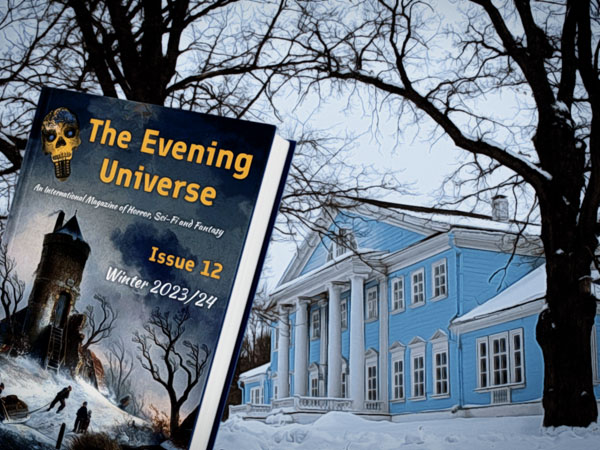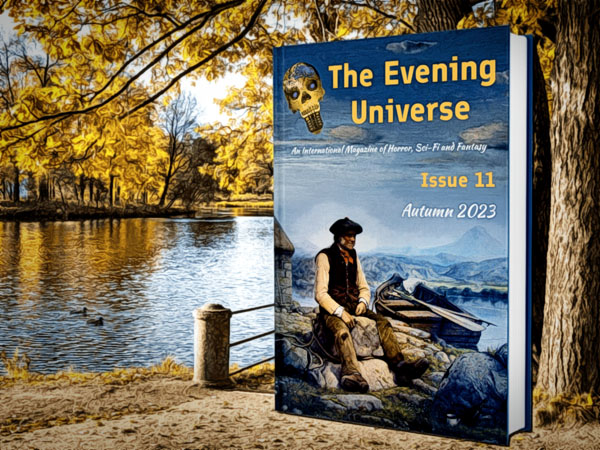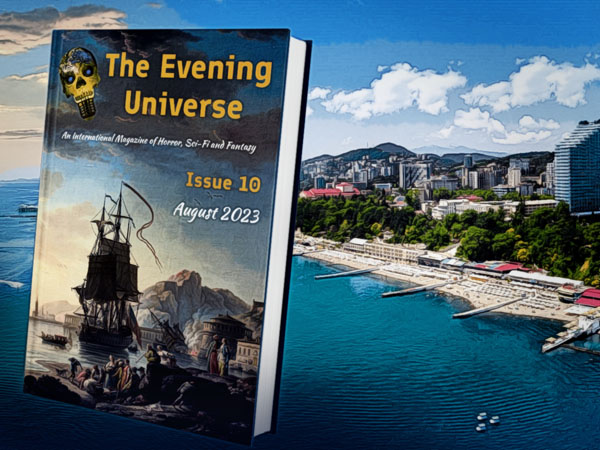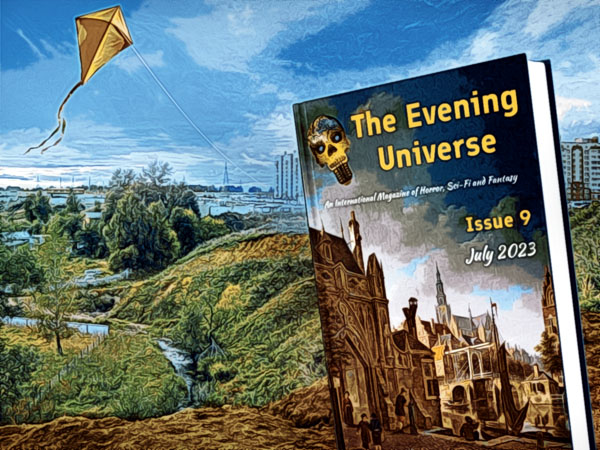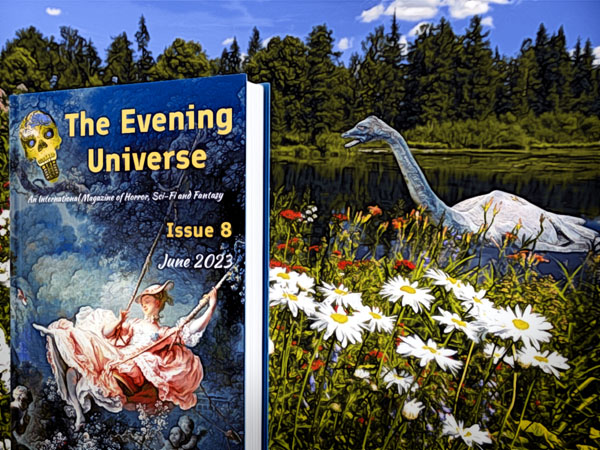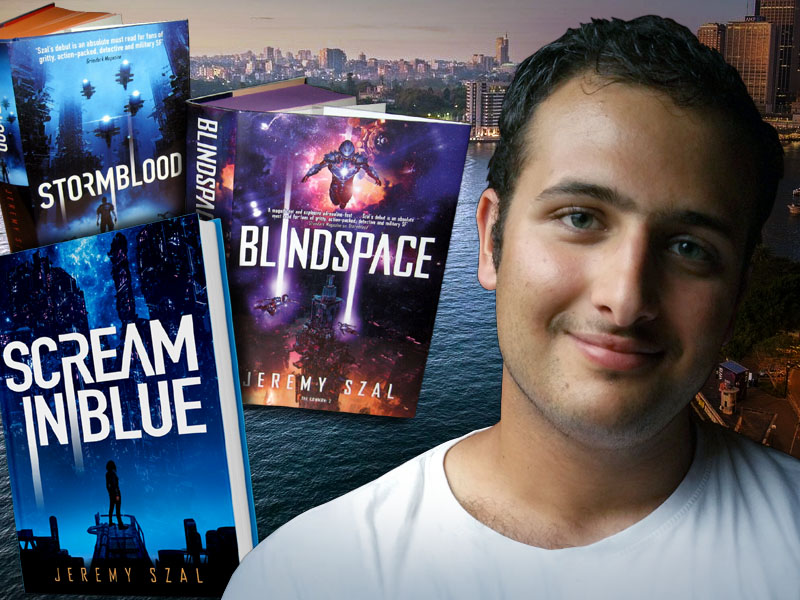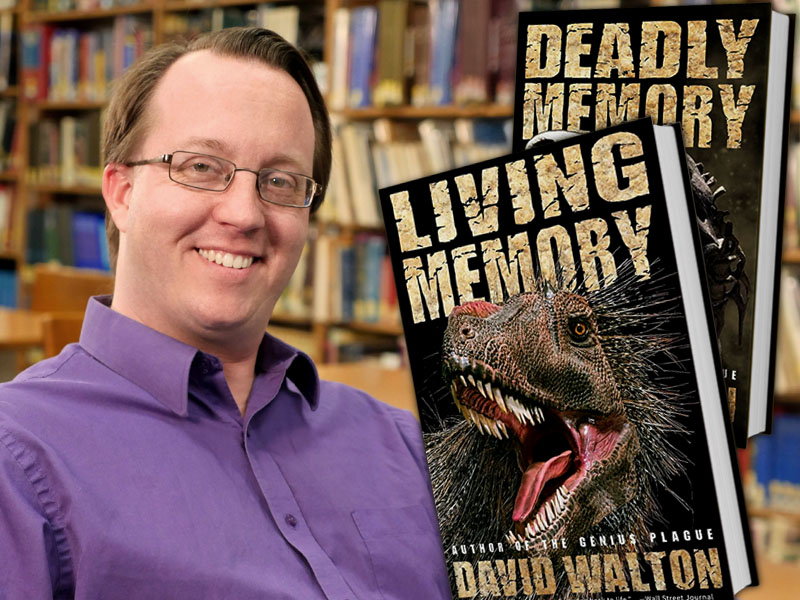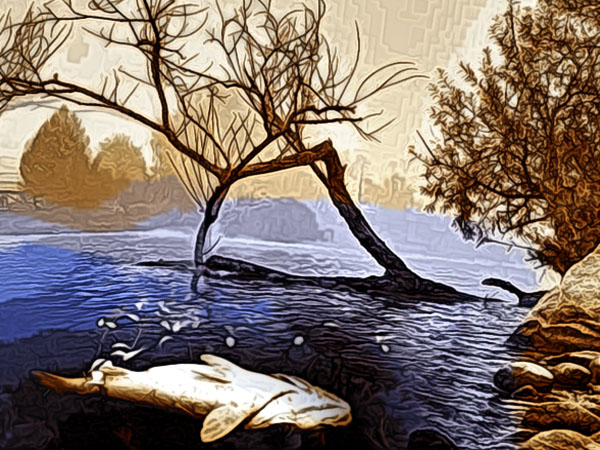
Ashley turned off the busy interstate highway. She drove down one long overpacked road after another. Ten miles took nearly thirty minutes to reach her destination. She turned down the river road. It was almost deserted as most people raced from one job to another, or perhaps to their sleeping places.
She paused at one of the drive through pull-offs. A brown and muddy river had been beautiful many generations ago. Dead limbs stood where trees had once towered over the river. Sludge filled; the oily stream struggled slowly downstream to join the ocean.
The pull-offs had been designed to make this a place to eat between jobs for today’s workers. Few wanted to stop here and contemplate what their grandparents had done to the environment.
Or how long the destruction would last. If they were lucky, and worked every waking moment, the grandchildren of today’s infants would once again see the river as it was meant to be seen.
Ashley started the car and drove on to her destination. A dilapidated building that had once been an elementary school, and formerly a high school leaned out over the murky water below. A broken and rusted fence hung at odd angles where it still remained semi-upright.
Ashely pulled into the parking lot. Most of the asphalt was overgrown with weeds. A small maintained section was large enough for a delivery truck, five cars, and an ambulance. She parked in the one open place.
Before she stepped out, she observed the surroundings. A grim place. It had once been three wings of a beautiful two-story school, with an open courtyard in the center. Any plantings in it were long gone. It had been paved over, easier to move about, and to clean. A single plant holder sat at the door that was supposed to be the front registration counter. Patients arrived by ambulance. They left the same way.
She picked up her tablet and recorder. This wouldn’t be the worst place she had done this job. Recording the stories of the childless generation. The worst had been the prison in the Florida Keys. Or maybe, the one in California. The people here weren’t to blame for the damage done to the environment, or even to themselves. That was their grandparent’s fault, though the grandparents of the first childless generation blamed them for their circumstances. As if they could control the fickle job market themselves. Or the failing environment.
Ashely snorted at the thought.
She walked through the unlocked front doors. A metal security detector leaned at an awkward angle, ready to fall. A remnant from the tiny baby boom after this generation was past child bearing age, when their younger cousins raced to have children between economic downfalls. This place had been a packed elementary school for seven years, and closed three years later, when few, if any children were born.
The counter was covered in stacks of paper tossed about as if someone had pawed through them in a great hurry.
“Can I help you?”
Ashley glanced at the man who spoke. He was in front of the counter pushing an empty wheelchair. “I’m Ashley. Here for the history recording project.”
The man nodded. “Nice job. Glad you could come. I’ll get the files for you. Follow me.” He rolled the empty chair down the hall.
“I’m Ethan. I know they’ll appreciate their stories being remembered. Do you really think they will be?” He stopped and stared at her.
Ashely looked away before looking back. “I hope so. That is the goal. That my childless generation will be the last. That we can rebuild what the past destroyed.”
“Will their stories be heard?”
“They will. In a bright future.” At least, she hoped. After the last war, the law required almost every able-bodied person to work one commerce job, and one clean up job. Whether recycling, cleaning water ways, planting trees, gardens, working with animals, or any of a dozen other jobs that would hopefully bring the planet back to life.
The first childless generation hadn’t fared well. They’d fought to bring the Earth back to life, only they were so destroyed already by the toxins in their bodies, they quickly became unable to work any job. They were bundled off to these care homes. There simply weren’t enough young, able-bodied people to care for them, and try to save the planet.
Ethan pushed the wheelchair down a dingy green hall. Rubber skid marks crisscrossed the unwashed floor. He stopped at another counter. “Emma, Olivia. Ashley is here.”
Two women, a year or two younger than herself stepped out of an inner room laughing.
“Who are you taking her to see?” One of the women twirled her hair and eyed him.
“Who is awake today?” He ignored her look.
“Half the Jasons, a few Brians, Williams, two Dans, three Tims, Jeremy, and one Chad.” The other nurse flipped her clipboard.
“Four Jennifers, two Amys, three Kims, though leave Kim P alone, four Heathers, two Elizabeths, Amanda, and three female Tracys. The male Tracy is not available for visitors today. ” She snapped it shut and glanced at Ashley. “How many do you hope to speak to today?”
Ashely drew her breath in. Most visits she recorded two or three people per day. She could be here a month. “I hope to speak to three of the women today. Maybe the Jennifers.”
The brisker nurse nodded. “One refuses to answer to anything other than Jenny. Another refuses to answer to Jenny.”
“I’ll ask them what they prefer to be called.” Many people had a preferred name pronunciation. One Ashley only answered to Ashes.
The brisk nurse ushered the giggly nurse back into the inner office.
Ethan pushed the empty chair down the hall.
After the door clicked shut, he stopped and grinned at her. “I’ll never understand Emma. She thinks I’ll be interested in her. I’m not. Nor in silent Olivia. My partner works on the river only. She’s working on a way to filter out the impurities.”
“I read about someone trying to filter the whole river.”
“That’s her! If the people here didn’t need me so much, I’d stay on the river with her. My aunt is here though. Deafblind, and needs someone she can trust. The J hall is this way.” He led her through the maze to an open door. “All four Jennifers live in here. It isn’t nice.”
Ashley walked through the door he held open.
Four tiny hospital beds. One in each corner. A dingy lightbulb hung above each. No sound, other than a fly buzzing. The women didn’t even glance at her.
“I’ll be back in half an hour.” Ethan walked on down the hall.
Ashley turned to the first Jennifer. Her paper name plate read Jenny. She pulled up the only dirty chair in the room. “Hi. I’m Ashley. I’m here to record your stories.”
The woman grunted. “We rarely talk.”
“Can you tell me why?”
“No one to talk to.” Her voice creaked. “Nothing to say. Almost forgot how.”
“Do the nurses talk to you?”
“Only to say it’s meal or medicine time. Ethan tries.”
“How often is he here?” She opened her tablet and typed a few words.
“About ten minutes a week per room.” Jenny closed her eyes.
It always took a while to start a conversation. Usually, once it began, all the fear and pain of their lives bubbled over the broken dams, and gushed forth, covering the barren plains with polluted water. Only, it was their memories contaminated with pain, fear, and self-loathing.
“What stories would you like the world to know about you?”
Jenny’s hand reached for hers. “I wanted to be an archeologist. I wanted to explore and find the unknown civilizations of my forgotten and criminalized ancestors.”
“Which ancestors?”
Jenny smiled. “My Native American ancestors. Not sure which tribe I belonged to. Likely more than one, as so many combined in later years to survive.”
It was true. What had once been thousands, or tens of thousands of tribes, was now officially only three. None were full blooded. All were mixed, either from multiple tribes, or with Europeans and Africans who had come much later. “What happened?”
“I went to college. Professors did not think I would succeed. No jobs upon graduation. I took a fast food job, hoping to find a career in my field. Like so many others. My dreams were forgotten. I scraped a living, until I no longer could. Couldn’t breathe, eat, or walk.”
“What did you see?”
Jenny gripped the paper-thin blanket. “I was part of the crew that blew up the dam. The largest dam in the country. We had to let the water flow again. If it didn’t, your generation would have died before birth.”
Ashley nodded. She had met many who had been in the resistance organizations. Many were in the prison care centers. Not all.
“Were you caught?”
“In the flood. Broke both legs. Would never walk again.”
“Thank you.”
Jenny smiled. “Is the water clear yet?”
“In some places. The Colorado is mostly clear. Not here though. We don’t know why.”
“I did once. I understood the deep underground water tables. All of it was stored on the internet, for anyone to see and use. Then, they hid it. Some of us kept copies. There are still some. Somewhere.”
“What do you remember?”
“Something about the cycle. It cycles in and out of deep wells in the ground. Wells that had been filled with garbage for generations. If you can’t get the rubbish out, the water will never run clean.”
“Can you talk to Ethan about this? He works on cleaning up the river.”
Jenny smiled. “I’ll try. If he has time. You won’t tell anyone what I told you?”
Ashely typed something in her notebook. “All confidential. Only those who want their real names used will I do so.”
“I have no family. I don’t think the authorities will come after me.”
“No. Most were forgiven and pardoned. You fought to save our country. Do you remember the toxic decades?”
Jenny closed her eyes. “The first, I was a child. A young girl with serious allergies and asthma. The air and water were cleaned up. Then. The toxic people returned to power and tried to destroy the land, air, and water once again.”
“And you stopped them.”
“Hardly me. It took tens of thousands of us to stop them. A flock of angry mother hens who never had a child of their own.”
“Could you have?”
“No. The toxins destroyed me as a child. I fought to give my nieces and nephews a chance. They waited too long to have children, based on the social prescription for marriage and child care of the time.
“So many of you who fought couldn’t have children.” Ashely made a few notes, and clicked boxes on the forms.
“We fought to save the land for future generations. Are the animals back?”
“In some areas. New animals. Loose animals from some of the zoos. It’s a different world now.”
“No television anymore?”
“No. It was used for so much bad. Now people have to work so much, they aren’t really living.”
“Like my generation. That’s not good.”
“There is hope. Soon.”
“Keep up the fight. Keep it.” Jenny held her hand tightly.
“What do you do each day?”
“Re-live the past. What did we do wrong? What could we have done different? Should we have died?”
Someone knocked on the door.
Ashley looked up.
Ethan waited for her. “Do you want to see anyone else today?”
“No. Jenny needs to tell you her story.”
He smiled and wheeled the empty chair to the bed. Ethan pulled it up beside her bed and sat in it. He reached his hands out to Jenny. “Tell me.”
Ashley glanced at him. His hands. One was not human. It was bionic. She realized why he had the chair when she glanced at his legs. One leg was too thin. Bionic also.
He held his finger up to his lips. “Patients know. Nurses don’t. And mustn’t. Especially Emma.”
Ashley nodded. He was one of the revolutionaries. One who survived. His reward had been a working leg and arm. As well as fighting to save the river he valued almost more than people. It made sense.
He wasn’t just Ethan.
He was the Ethan who had led the Water Rescuers. He had been sucked into one of the turbines and almost lost his life. One of the last to be given prosthetics.
The prosthetic makers had died trying to save so many lives. Their secret methods had disappeared with them. Many of the prosthetic materials had been outlawed. Scientists were trying to find ways to return the unknown materials to a safe, natural state. Future prosthetics would be wooden, or other natural materials. Once trees fully matured in forests again.

